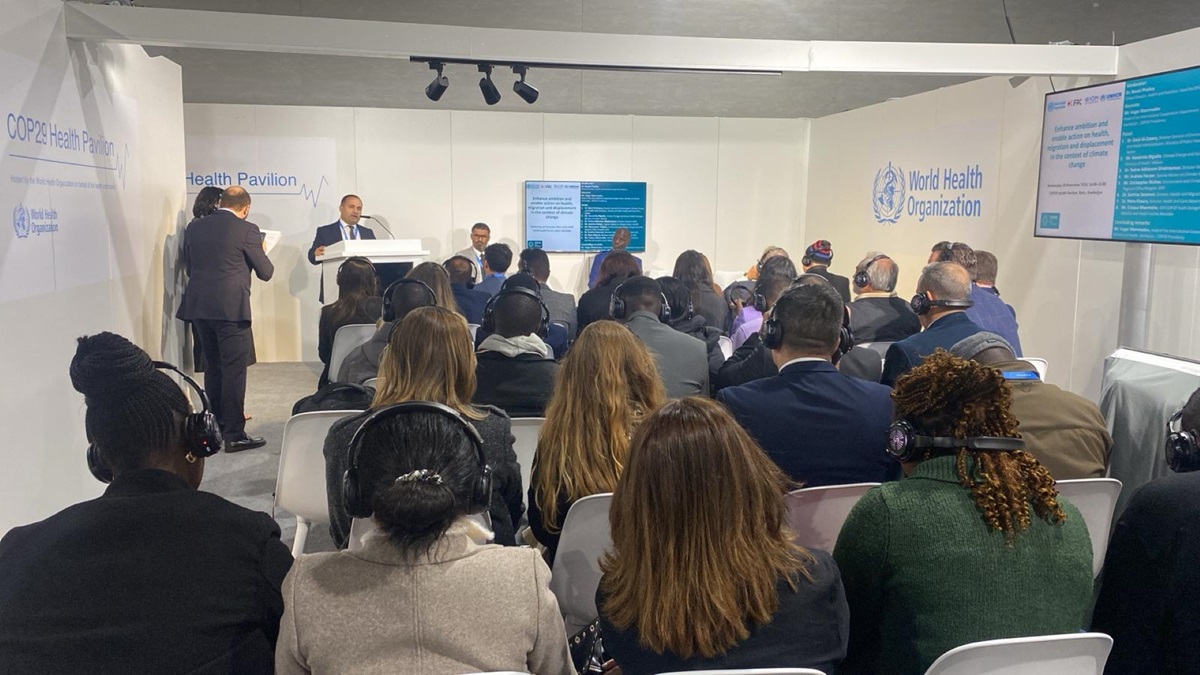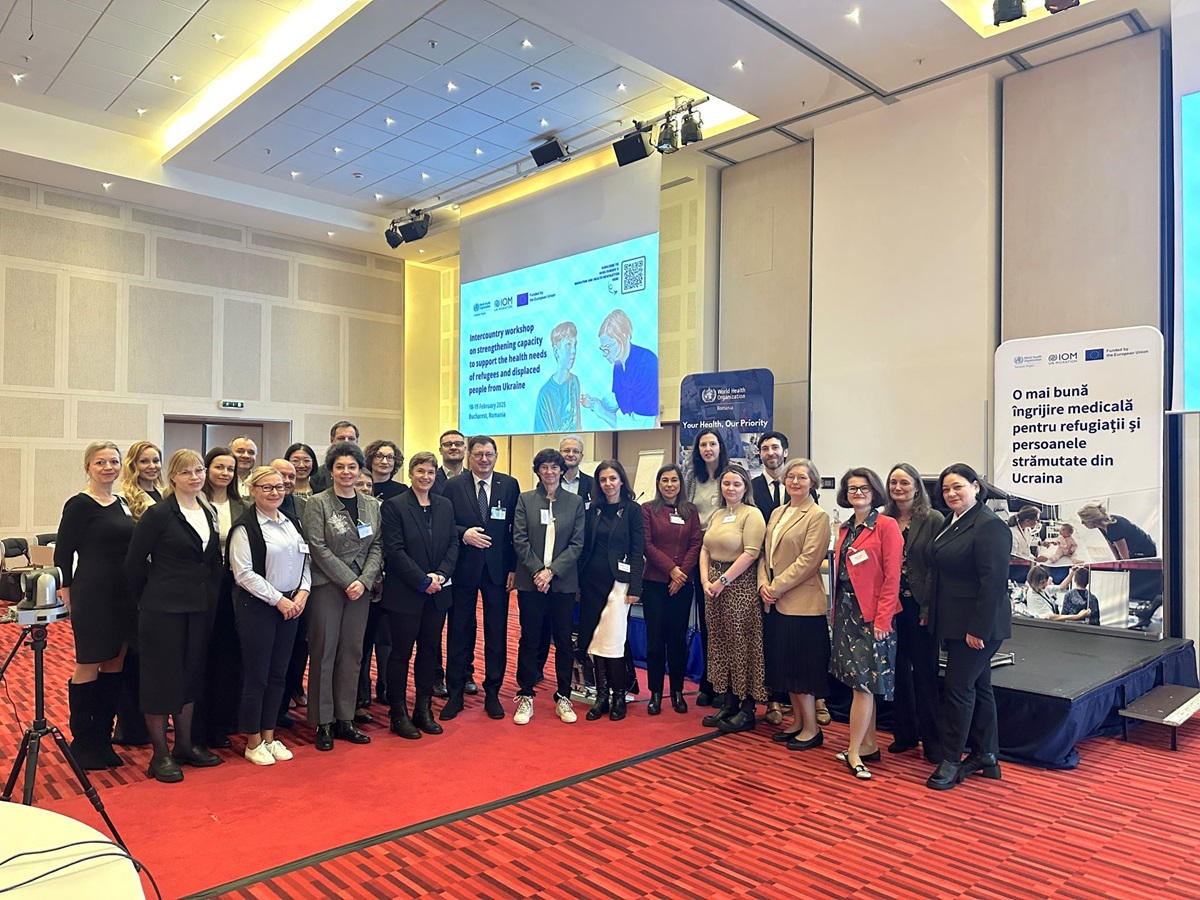Migration and health news from around the WHO European Region
No images? Click here
Migration and health news from around the WHO European Region.

Migration and Health Newsletter
March 2025

Building migrant- and refugee-inclusive health systems in a changing climate
20 November 2024, Baku, Azerbaijan
At COP29 in Baku, Azerbaijan, WHO, in collaboration with UNHCR, IOM, and IFRC, hosted a pivotal event addressing the intersection of climate change, migration, and health. “Up to 1.2 billion people could be displaced by 2050 due to climate-driven events. The climate crisis is a health crisis, including the health of migrants,” WHO Director-General Dr. Tedros Adhanom Ghebreyesus stressed. He called for urgent global action to ensure migrant health is integrated into future COP declarations. Alongside this event, WHO launched the Evidence Brief on strengthening health systems to improve the health of displaced and migrant populations in the context of climate change. The full findings will be published as a Global Evidence Review on Health and Migration (GEHM) this year. The evidence brief outlines key interventions to support migrant-and refugee-inclusive health systems in the changing climate to meet the new challenges faced. The evidence brief calls for building migrant-inclusive and climate-resilient health systems to protect migrant and refugee populations in vulnerable situations in a rapidly changing climate.
Read the evidence brief here.

25 November 2024, Rome, Italy
WHO Health and Migration launched a training programme in Rome, Italy, with policy-makers from seven countries to strengthen skills of health workers to enhance refugee and migrant health outcomes. Translating the refugee and migrant health Global Competency Standards for health workers, this five-day course focused on culturally sensitive and inclusive healthcare strategies.
Through interactive sessions, experience-sharing, and case studies, participants explored practical approaches to integrating competency standards in their national health systems. The training, organized in collaboration with the Italian National Institute of Health, Migration and Poverty, underscores WHO’s commitment to ensuring no one is left behind in healthcare access.
As global displacement and migration reaches unprecedented levels, health systems must adapt to meet the needs of refugees, migrants, and host communities. Equipping health leaders, policy-makers, and providers with the right skills is essential to ensuring inclusive, responsive, and equitable healthcare for all.
Refugee and migrant health: Global Competency Standards for health workers

22 January 2025, Global
WHO Health and Migration, in collaboration with EVIPNet and WHO’s Research for Health Department, hosted the first Global Engagement Webinar, bringing together over 670 participants worldwide. The session focused on translating the Global Research Agenda (GRA) on health, migration, and displacement into actionable, evidence-informed policies. The webinar fostered a dynamic exchange on addressing knowledge gaps and research priorities. Experts shared insights on regional and national implementation, funding gaps, and policy integration, while participants explored case studies, key lessons, and opportunities for adapting the GRA at different levels. WHO is actively implementing the GRA at global, regional, and national levels using the WHO Implementation Guide and Toolkit. In South Africa, efforts are underway to develop the first national research agenda and action plan in collaboration with the Ministry of Health and WHO Country Office. In the Western Pacific Region, work is advancing on the first regional research agenda and roadmap. Globally, WHO is leading the first research prioritization exercise on health, migration, and displacement in the context of climate change.
Watch the recording here.
Read our publication about the Global Research Agenda (GRA) on health, migration, and displacement here.
Register for upcoming sessions of the webinar series here.

Intercountry workshop on strengthening capacity to support the health needs of refugees and displaced people from Ukraine
18-19 February, Bucharest, Romania
On 18–19 February 2025, WHO/Europe brought together key representatives from the ministries of health of Bulgaria, Estonia, Hungary, Lithuania, Poland, the Republic of Moldova, Romania and Slovakia, along with partners from the European Union (EU), WHO and the International Organization for Migration (IOM), in Bucharest, Romania, as part of its joint project with IOM and the EU.
The intercountry workshop was organized to share lessons learnt and good practices among countries, facilitate communication exchange among national health authorities on strategies to meet the health needs of refugees and displaced people from Ukraine, and identify areas of support for Member States, including cross-border collaboration.
The agenda focused on a range of critical topics, including supporting displaced health workers from Ukraine to continue their professional development in the host country, tailoring public health messaging for Ukrainian communities, enhancing immunization coverage and ensuring access to health services.
Representatives also discussed how to overcome barriers that prevent refugees from accessing care and the importance of strengthening the response from health systems.
Learn more about the joint project here.
Read the project brief here.

Immigration detention conditions in Sweden mostly align with WHO guidance, new study says
11 March, Stockholm, Sweden
How to improve migrant health at immigration detention centres in Sweden is the focus of a new policy brief which looks at current conditions in detention centres in the country. The brief was produced by the Migration Studies Delegation (Delmi), in partnership with the WHO Collaborating Centre on Migration and Health Data and Evidence at Uppsala University in Sweden.
The brief is guided by a previous WHO/Europe country implementation guide on immigration detention, which found that immigration detention can have a severe impact on migrants’ health, especially on their mental health, during and after release from detention.
On 11 March, the WHO Collaborating Centre on Migration and Health Data and Evidence brought together migration and health stakeholders in Stockholm to launch the policy brief and discuss the health impacts of immigration detention and how Swedish policies impact the health of migrants in Sweden and globally. The event was co-hosted with Delmi and the Expert Group for Aid Studies (EBA).
The event was also attended by the Migration and Health Programme at the WHO/Europe to deliver a presentation on the work that is done to support Member States in refugee and migrant health.

Launch of the Sixth Global Evidence Review on Health and Migration: Spotlight on Dementia
31 March 2025, Global
On 31 March 2025, WHO will launch the sixth report in the Global Evidence Review on Health and Migration (GEHM) series, focusing on dementia in refugees and migrants. With 3.6% of refugees and 17.2% of migrants over the age of 60, ensuring their inclusion in healthy ageing policies and access to health and social care services is crucial.
Developed by WHO Health and Migration and the Department of Mental Health, Brain Health and Substance Use, in collaboration with global expert academics, this report explores the public health impacts, global challenges, and priority actions needed to improve dementia care for migrants and displaced populations. It highlights key evidence gaps, especially in resource-limited and emergency settings, and underscores how migration policies, health systems, and sociocultural factors shape access to care.

New WHO Tool: Dashboard on Global Experiences in Promoting Refugee and Migrant Health
Ongoing, Global
With 1 billion people on the move globally, ensuring equitable access to timely, affordable, and dignified health care is critical. WHO has launched an interactive dashboard showcasing how countries worldwide are improving refugee and migrant health through examples of policies, programs and interventions.
Based on voluntary submissions from governments and partners, the dashboard features 140 case studies selected from 210 project examples submitted in 2022 and 2023. These initiatives align with the six priorities of the WHO global action plan on promoting the health of refugees and migrants, 2019–2030 and demonstrate effective public health responses, policy integration, and cross-sector collaboration.
Explore case studies on public health interventions, essential health services, policy integration, social determinants of health, health monitoring, and strategies to combat misinformation.
The 3rd open call will be launched in April 2025. For more information, visit WHO Health and Migration.
Read the WHO global action plan on promoting the health of refugees and migrants (2019–2030) here.
Visit the interactive dashboard and learn about global experiences here.








